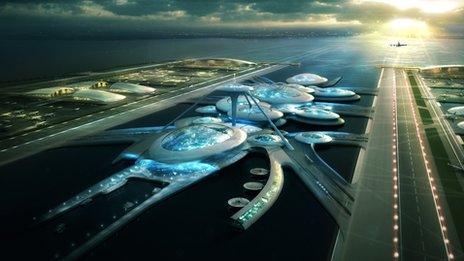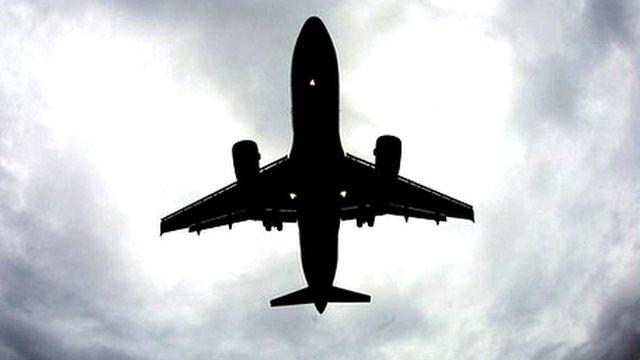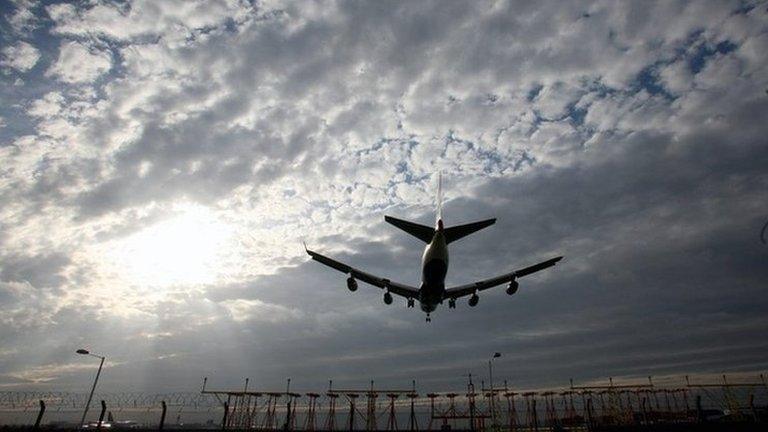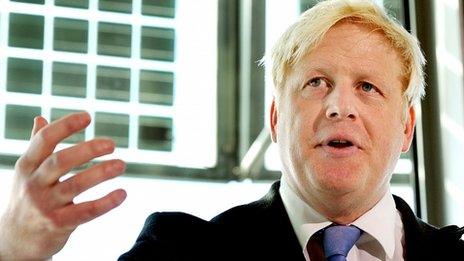Heathrow report: Lack of airport capacity costs UK £14bn
- Published
Heathrow chief executive Colin Matthews: "It is time to look at the options, although none are easy."
A lack of capacity at Heathrow is costing the UK economy £14bn a year in lost trade, according to a report commissioned by the airport.
That figure could rise to £26bn a year by 2030, the report said., external
Heathrow bosses are keen to see a third runway built at the west London airport, but the government has ruled it out for the time being.
The government has asked a commission headed by Sir Howard Davies to advise on future UK airport capacity needs.
The Davies Commission is expected to present an interim report to the government by the end of 2013, with a full report due in the summer of 2015 - after the next general election.
Heathrow's report, "One hub or none", was prepared for the airport by consultants Frontier Economics. It was commissioned to inform Heathrow's response to the Davies Commission but is not its formal submission.
Hub airports bring passengers from other airports so they can transfer onto flights to their final destination. About one third of passengers flying into Heathrow transfer onto other flights.
The report said that the choice for the UK was not between two hubs or one, but one hub or none.
'Out of sync'
It said only one airport could operate as a hub in the UK and said the government could either do nothing and "let the UK fall behind competitors", add additional capacity at Heathrow, or close Heathrow and replace it with a new larger hub airport.
Heathrow chief executive Colin Matthews said: "If anyone was still in doubt about the importance of aviation to the UK economy, today's report should lay those doubts to rest.
"The new work we are publishing today shows that only a single hub airport can meet the UK's connectivity needs and the choice is therefore between adding capacity at Heathrow or closing Heathrow and replacing it with a new UK hub airport."
He told the BBC: "Transfer traffic is the mechanism that makes routes economically viable. If you could not offer the feed, a lot of routes would not be possible."
However, critics said the report lacked credibility. Joss Garman, political director of Greenpeace, said: "This completely biased report from the owners of Heathrow is out of sync with other more independent reports on London's connectivity, and it simply recycles the aviation lobby's tired and discredited arguments.
"The case for a third runway has never been weaker, and it's time the aviation industry woke up to the reality that Heathrow expansion will never happen because it would be political, economic and environmental madness."
He pointed out that the report referred to Heathrow falling behind Paris and Frankfurt on flights to mainland China, but if you included Hong Kong, then London had more flights to China than any other European rival.
The report looked at the number of connections and passengers that there would be if there was unconstrained capacity at the UK's hub airport and compares this with the number of passengers that there would be without any new runway capacity.
It then calculated the level of trade that is being missed out on because of that connectivity gap.
But John Stewart, chair of the campaign group Hacan, said there was no evidence that London's economy would lose out if Heathrow did not expand as a hub.
"The reason for this is London's importance as a destination to business people," he said.
"Heathrow has the largest number of terminating passengers of any airport in the world. It therefore does not need the extra passengers an expanded hub would bring to make it commercially viable to operate lots of flights to key business destinations."
Noise restrictions
On Tuesday, London Mayor Boris Johnson met Sir Howard, stating his opposition to a third runway at Heathrow, and putting forward the case for a Thames estuary airport.
The all-party 2M Group, which represents more than 20 councils close to Heathrow, has said it will tell the Davies Commission that loosening restrictions on Heathrow's existing runways would destroy the quality of life for people living near the flight path.
A Department for Transport spokeswoman said that the UK was one of the best connected countries in the world, and maintaining its airport network was vital to the economy.
"The strength with which the different options for achieving this are put forward shows precisely why we were right to set up a proper independent review with the timescale to consider fully what is in the country's interest," she said.
A report by the Policy Exchange think tank, external last month supported replacing Heathrow's existing runways with four new ones immediately to the west of the current site as the best option for increasing airport capacity in the UK.
It also advocated much tighter restrictions on operating hours, permitted aircraft type and the steepness of take-off and descent, in order to reduce noise pollution over London from current levels.
Other options to expanding Heathrow include building a second runway at Gatwick or Stansted, expanding Luton, or replacing Heathrow with an airport in the Thames Estuary, as favoured by Mr Johnson.
Gatwick Airport responded to Heathrow's report by saying: "A new runway at Gatwick could be more affordable and practical than other options and give passengers a greater choice of routes to key destinations. Critically, we would have a significantly lower environmental impact compared to an expanded Heathrow.
"The Airports Commission needs to look to the future and not to Heathrow's monopoly past. It will need to decide whether a competitive airports' network in London, delivering more passenger choice, connections, convenience and lower prices, is more preferable to propping up an outdated and unnecessary expanded Heathrow."
- Published13 November 2012

- Published2 November 2012

- Published1 July 2015

- Published4 October 2012

- Published2 November 2012
.jpg)